For Democrats, the decisions being made of whether to support impeachment proceedings against President Donald Trump are personal, gut-wrenching and, at times, starkly political, with fallout in 2020 and beyond.
Some lawmakers worry impeachment will benefit the president, energizing Trump's supporters and solidifying his campaign, much the way the proceedings against Bill Clinton ended up costing Republicans in 1998.
Others warn that failing to impeach Trump risks deflating Democratic voters they need to turn out in 2020.
And still others envision a "nightmare" scenario: The House votes to impeach, but the Senate declines to convict, Trump survives to win a second term and Democrats lose majority control.
The arguments, being made out loud and behind closed doors, show the depth of the discussions among Democrats and could set the party on a path toward — or away — from an impeachment proceeding, with lawmakers and the party's voters anxious to get it right.
"Literally all I get when I get home is, 'Get rid of him. We got to get rid of him,'" said Rep. John Yarmuth, D-Ky., the chairman of the Budget Committee, who represents Kentucky's liberal stronghold in Louisville and supports impeachment.
But Democratic Rep. Hank Johnson, a member of the Judiciary Committee, from the Atlanta suburbs, is holding back. He's worried impeachment will put his colleagues, including many freshmen, in a tough position that could cost Democrats their majority and leave Congress with no checks on Trump's second term.
"I think we have to pay close attention to what's going on in the 30 or so swing districts, what are those people thinking," he said. "I'm thinking beyond my district and I'm thinking beyond the here and now."
While House Speaker Nancy Pelosi says Congress shouldn't impeach for political reasons or not impeach for political reasons, Democrats acknowledge that political considerations overhang the decision making.
Nearly 60 House Democrats now favor launching an impeachment inquiry, but many of them come from politically safer Democratic strongholds, not the swing districts that gave Democrats the majority. Pelosi has resisted their push, and instead is nudging the House forward on a slow if steady "path," as she calls it, digging into special counsel Robert Mueller's report, investigating Trump's finances and running of the government, and engaging in court battles with the administration.
"I don't think there's anything more divisive we can do than to impeach a president of the United States, and so you have to handle it with great care," Pelosi said in a recent interview at the Council of Foreign Relations. "It should by no means be done politically."
At the same time, impeachment is nothing but a political process, say those who favor the proceedings, a path for removing the president that's embedded in the Constitution and deliberately placed beyond the reach of the ballot box.
Erza Levin, co-founder of the Indivisible, a liberal advocacy group, acknowledges it's "at best unclear" what impact impeachment would have on the coming elections.
There's the risk of impeaching, he and others say, but also the risk for Democrats of doing nothing. And even if the House votes to impeach Trump and the Senate declines to convict, he said, it may be politically worthwhile to force the Republican senators who are up for re-election in Colorado, North Carolina and other swing states to vote.
Besides, if the political fallout is unclear, Levin said, "then we should do what's right."
And so the conversations go. Against these blunt political calculations are the personal ones, as lawmakers consider what's at stake for constituents, the country and their own what-did-you-do-when moment in history.
Rep. Alexandria Ocasio-Cortez, the party's rising star from New York who supports starting an inquiry, said the decisions shouldn't be about elections or polls.
"Impeachment is incredibly serious," she said on ABC's "This Week." ''This is about us doing our jobs. And if we're talking about what's going to be a victory for Trump and what's not going to be a victory for Trump then we are politicizing and we are tainting this process, which, again, should be removed from politics."
Rep. Karen Bass, D-Calif., worries what happens if the House votes to impeach but Trump remains in office. "If we did impeachment today, we would make my constituents very happy — and then they would be angry," she said. "My concern always is suppressing the desire to vote."
Advocates for impeachment held rallies in several cities over the weekend, the start of what they say will be a long summer of educating the public about the process. Turnout was nowhere near the levels needed to shift the debate. But some new supporters did emerge.
New York Democratic Rep. Carolyn Maloney announced her decision in favor of impeachment at a Foley Park rally "after doing as much soul-searching as I've ever done in my life."
She said impeachment would be "a painful ordeal for our already divided nation." But in going forward, she said, she hoped "we will emerge stronger than before."
David Sievers, the campaign manager at the liberal group MoveOn, which helped organize the rallies, expects more lawmakers will come forward.
But where the conversation goes remains uncertain.
"We have 234 members," said Majority Leader Steny Hoyer, the No. 2 House Democrat, in a briefing with reporters. "So I think there are a multiplicity of things running through our members' heads and Americans'," he said, on what to do.
Associated Press writer Laurie Kellman contributed to this report.
VENICE, Italy (AP) — Under the gaze of the world’s media, the fragile lagoon city of Venice launched a pilot program Thursday to charge day-trippers a 5-euro ($5.35) entry fee that authorities hope will discourage visitors from arriving on peak days and make the city more livable for its dwindling residents.
Visitors arriving at Venice's main train station were greeted with large signs listing the 29 dates through July of the plan's test phase that also designated separate entrances for tourists, and residents, students and workers.
“We need to find a new balance between the tourists and residents,’’ said Simone Venturini, the city’s top tourism official. “We need to safeguard the spaces of the residents, of course, and we need to discourage the arrival of day-trippers on some particular days.”
Not all residents, however, are persuaded of the efficacy of the new system in dissuading mass tourism, insisting that only a resurgence in the population will restore balance to a city where narrow alleyways and water buses are often clogged with tourists.
Hundreds of Venetians protested against the program, marching festively though the city's main bus terminal behind banners reading “No to Tickets, Yes to Services and Housing.” Protesters scuffled briefly with police with riot gear who blocked them from entering the city, before changing course and entering over another bridge escorted by plainclothes police officers. The demonstration wrapped up peacefully in a piazza.
Tourists arriving at the main station encountered almost as many journalists as stewards on hand to politely guide anyone unaware of the new requirements through the process of downloading the QR code to pay the fee.
Arianna Cecilia, a tourist from Rome visiting Venice for the first time, said she thought it was “strange” to have to pay to enter a city in her native country, and be funneled through separate entrance ways for tourists. She and her boyfriend were staying in nearby Treviso, and so downloaded the QR code as required. But she was still caught off-guard while soaking in her first view ever of Venice's canals by the sight of the entrance signs and her boyfriend telling her to get out the ticket.
On the other side of the entrance ways, workers in yellow vests carried out random checks at the train station. Transgressors face fines of 50 to 300 euros ($53 to $320), but officials said “common sense” was being applied for the launch.
The requirement applies only for people arriving between 8:30 a.m. and 4 p.m. Outside of those hours, access is free and unchecked.
Venice has long suffered under the pressure of overtourism, and officials hope that the pilot project can help provide more exact figures to better manage the phenomenon.
The city can track the number of hotel visitors, which last year numbered 4.6 million and is down 16% from pre-pandemic highs. But the number of day visitors, which make up the majority of the crowds in Venice, could only be estimated until recently.
A Smart Control Room set up during the pandemic has been tracking arrivals from cellphone data, roughly confirming pre-pandemic estimates of 25 million to 30 million arrivals a year, said Michele Zuin, the city’s top economic official. That includes both day-trippers and overnight guests.
But Zuin said the data is incomplete.
“It’s clear we will get more reliable data from the contribution” being paid by day-trippers, he said.
Venturini said the city is strained when the number of day-trippers reaches 30,000 to 40,000. On peak days, local police set up one-way traffic for pedestrians to keep the crowds moving.
Residents opposing the day-tripper tax insist that the solution to Venice's woes are to boost the resident population and the services they need, limiting short-term rentals to make available more housing and attract families back from the mainland.
Last year, Venice passed a telling milestone when the number of tourist beds exceeded for the first time the number of official residents, which is now below 50,000 in the historic center with its picturesque canals.
“Putting a ticket to enter a city will not decrease not even by one single unit the number of visitors that are coming,’’ said Tommaso Cacciari, an activist who organized a protest Thursday against the measure.
“You pay a ticket to take the metro, to go to a museum, an amusement park. You don’t pay a ticket to enter a city. This is the last symbolic step of a project of an idea of this municipal administration to kick residents out of Venice,” he said.
Venice Mayor Luigi Brugnaro declared the launch day, coinciding with an Italian holiday, a success, registering 15,700 paying visitors, 50% more than anticipated.
More than 97,000 others had downloaded a QR code denoting an exemption, including to work in Venice or as a resident of the Veneto region. Hotels in Venice, including in mainland districts like Marghera or Mestre, provided a QR code for visitors to attest to their stay, which includes a hotel tax — accounting for 40,000 of those.
Venturini, the tourist official, said that interest in Venice’s pilot program has been keen from other places suffering from mass tourism, including other Italian art cities, and municipalities abroad such as Barcelona, Spain, and Amsterdam.
But Marina Rodino, who has lived in Venice for 30 years, doesn't see the fee as the cure-all. Neighboring apartments in her residential building near the famed Rialto Bridge once inhabited by families are now short-term apartment rentals.
The corner butcher shop closed. Yet she noted that the new entrance fee requirement will still allow young people to flood the city in the evening for the traditional aperitivo, which can grow rowdy.
She was passing out mock European Union passports for “Venice, Open City,” underlining the irony of the new system, and challenging its legal standing with citations from the Italian Constitution guaranteeing its citizens the right to “move or reside freely in any part of the national territory."
“This is not a natural oasis. This is not a museum. It is not Pompeii. It is a city, where we need to fight so the houses are inhabited by families, and stores reopen. That is what would counter this wild tourism,’’ Rodino said.
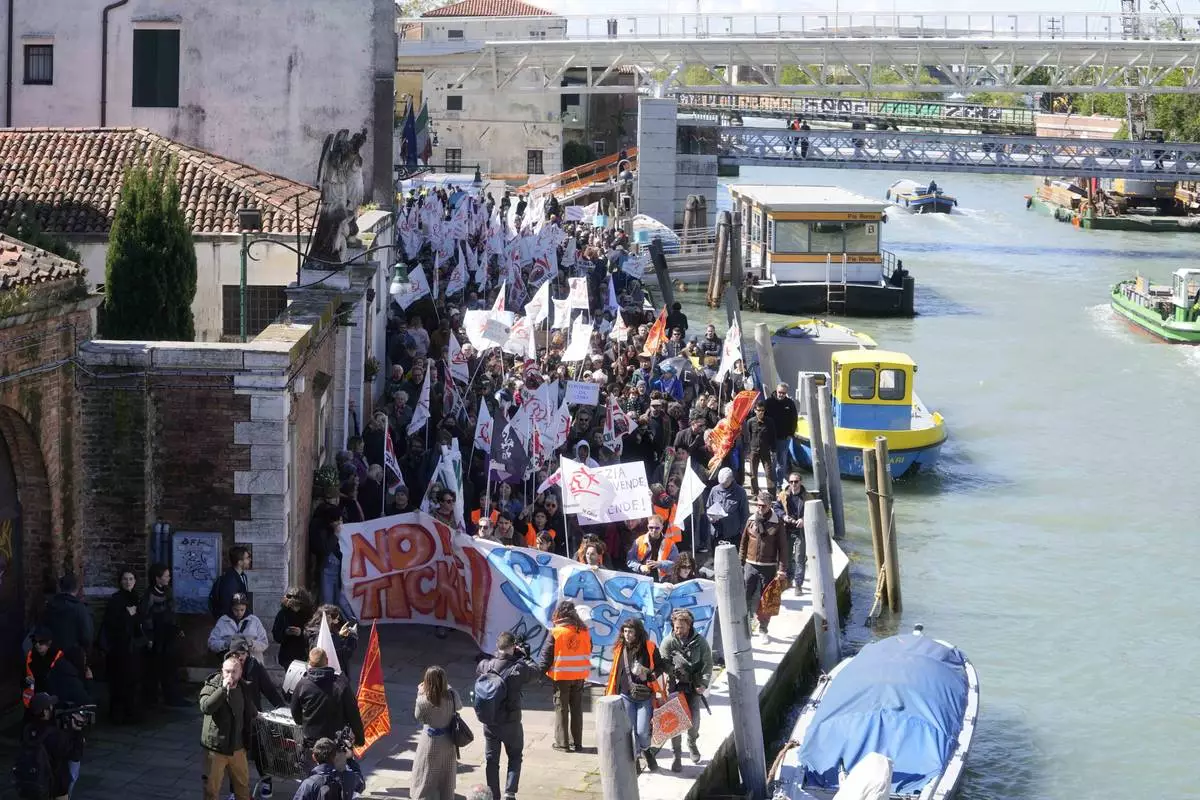
Citizens and activists stage a protest against Venice Tax Fee in Venice, Italy, Thursday, April 25, 2024. The fragile lagoon city of Venice begins a pilot program Thursday to charge daytrippers a 5 euro entry fee that authorities hope will discourage tourists from arriving on peak days. The daytripper tax is being tested on 29 days through July, mostly weekends and holidays starting with Italy's Liberation Day holiday Thursday. Officials expect some 10,000 people will pay the fee to access the city on the first day, downloading a QR code to prove their payment, while another 70,000 will receive exceptions, for example, because they work in Venice or live in the Veneto region. (AP Photo/Luca Bruno)

A citizen shows a ticket with the writing 'Veniceland' during a protest against Venice Tax Fee in Venice, Italy, Thursday, April 25, 2024. The fragile lagoon city of Venice begins a pilot program Thursday to charge daytrippers a 5 euro entry fee that authorities hope will discourage tourists from arriving on peak days. The daytripper tax is being tested on 29 days through July, mostly weekends and holidays starting with Italy's Liberation Day holiday Thursday. Officials expect some 10,000 people will pay the fee to access the city on the first day, downloading a QR code to prove their payment, while another 70,000 will receive exceptions, for example, because they work in Venice or live in the Veneto region. (AP Photo/Luca Bruno)
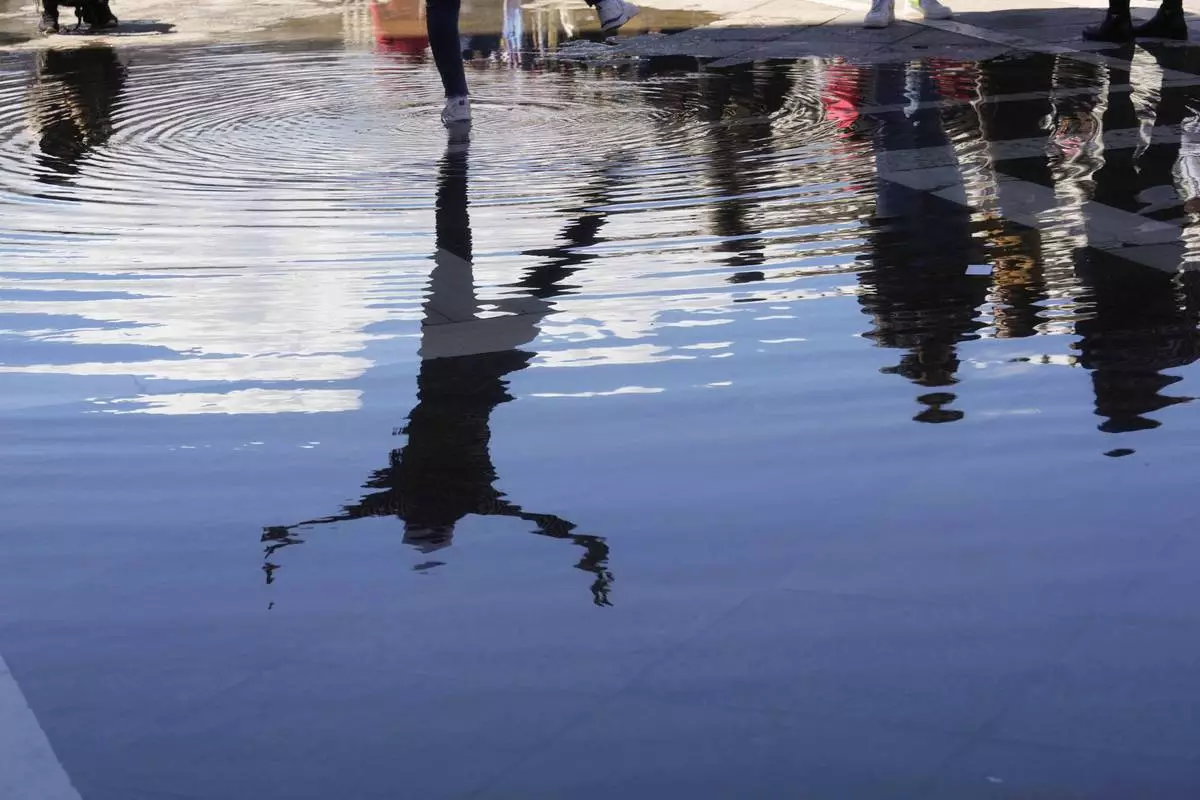
Tourists enjoy a sunny day at St.Mark square in Venice, Italy, Thursday, April 25, 2024. The fragile lagoon city of Venice begins a pilot program Thursday to charge daytrippers a 5 euro entry fee that authorities hope will discourage tourists from arriving on peak days. (AP Photo/Luca Bruno)
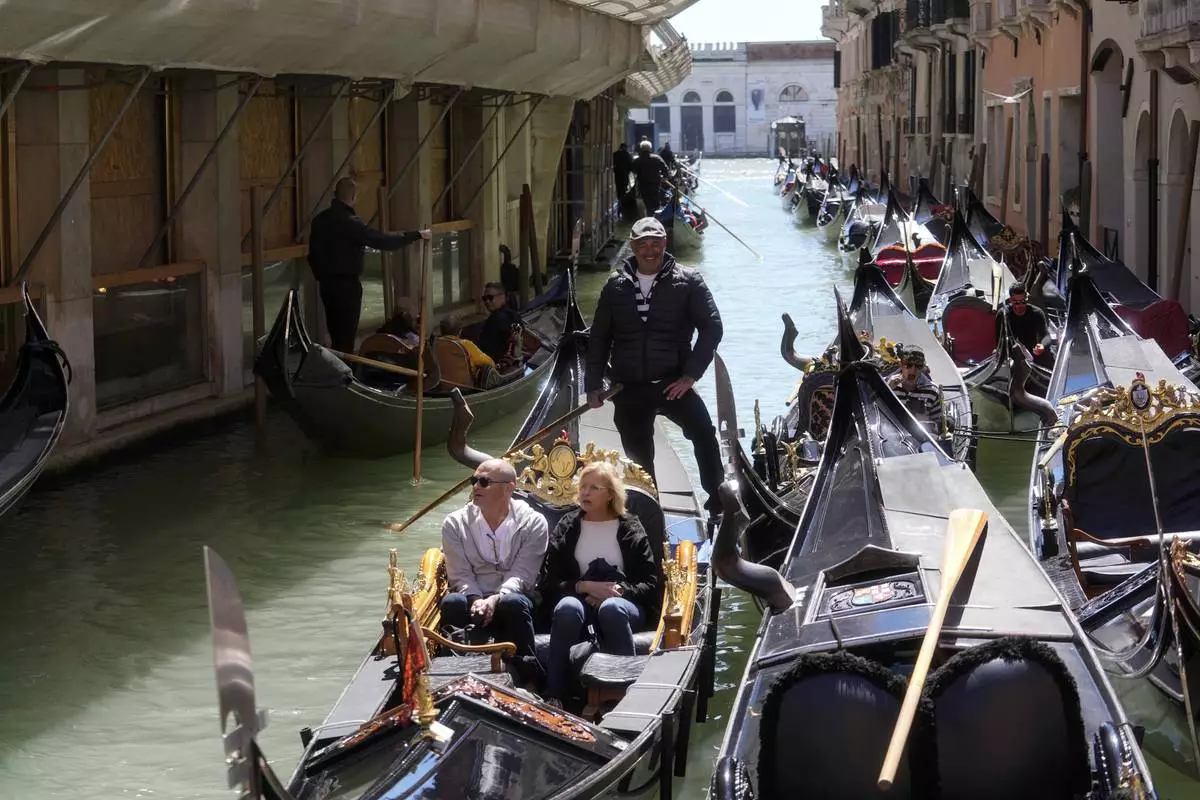
Tourists enjoy a ride on gondolas in Venice, Italy, Thursday, April 25, 2024. The fragile lagoon city of Venice begins a pilot program Thursday to charge daytrippers a 5 euro entry fee that authorities hope will discourage tourists from arriving on peak days. (AP Photo/Luca Bruno)

Citizens and activists confront police during a demonstration against Venice Tax Fee in Venice, Italy, Thursday, April 25, 2024. The fragile lagoon city of Venice begins a pilot program Thursday to charge daytrippers a 5 euro entry fee that authorities hope will discourage tourists from arriving on peak days. The daytripper tax is being tested on 29 days through July, mostly weekends and holidays starting with Italy's Liberation Day holiday Thursday. Officials expect some 10,000 people will pay the fee to access the city on the first day, downloading a QR code to prove their payment, while another 70,000 will receive exceptions, for example, because they work in Venice or live in the Veneto region. (AP Photo/Luca Bruno)
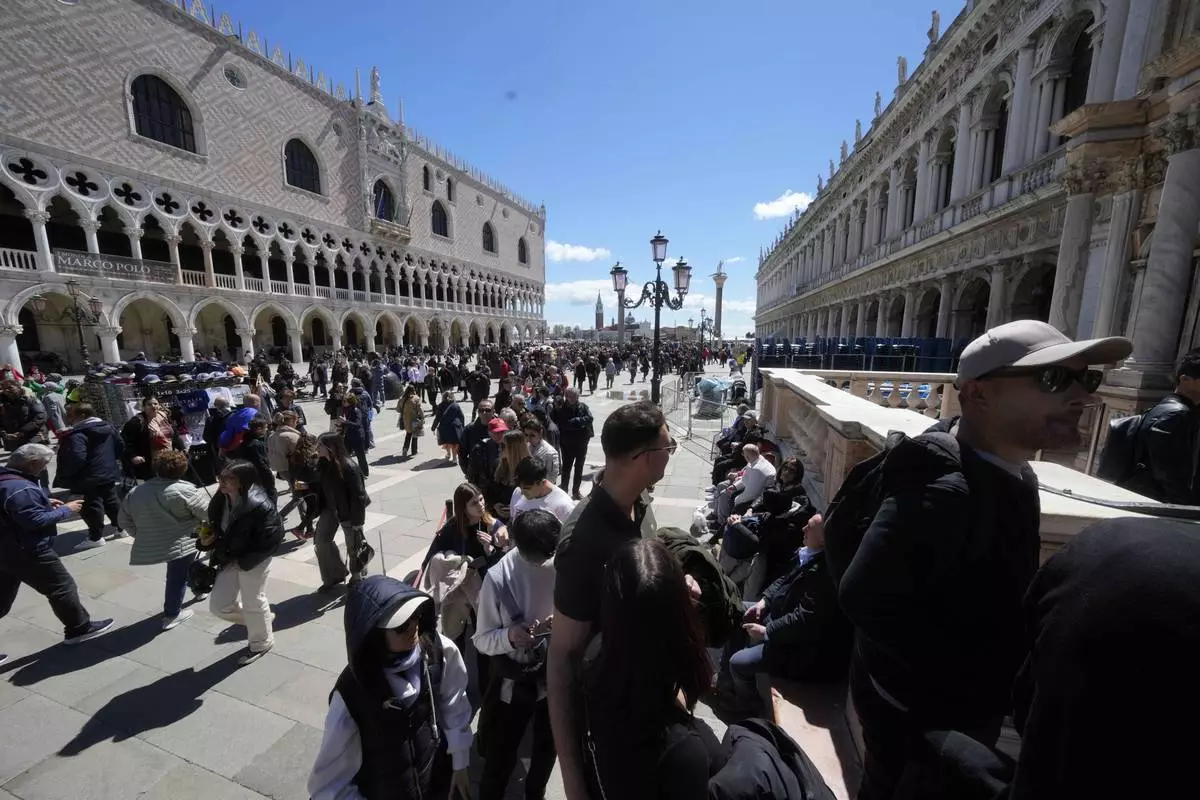
Tourists line up to enter at the at St.Mark bell tower in Venice, Italy, Thursday, April 25, 2024. The fragile lagoon city of Venice begins a pilot program Thursday to charge daytrippers a 5 euro entry fee that authorities hope will discourage tourists from arriving on peak days. (AP Photo/Luca Bruno)
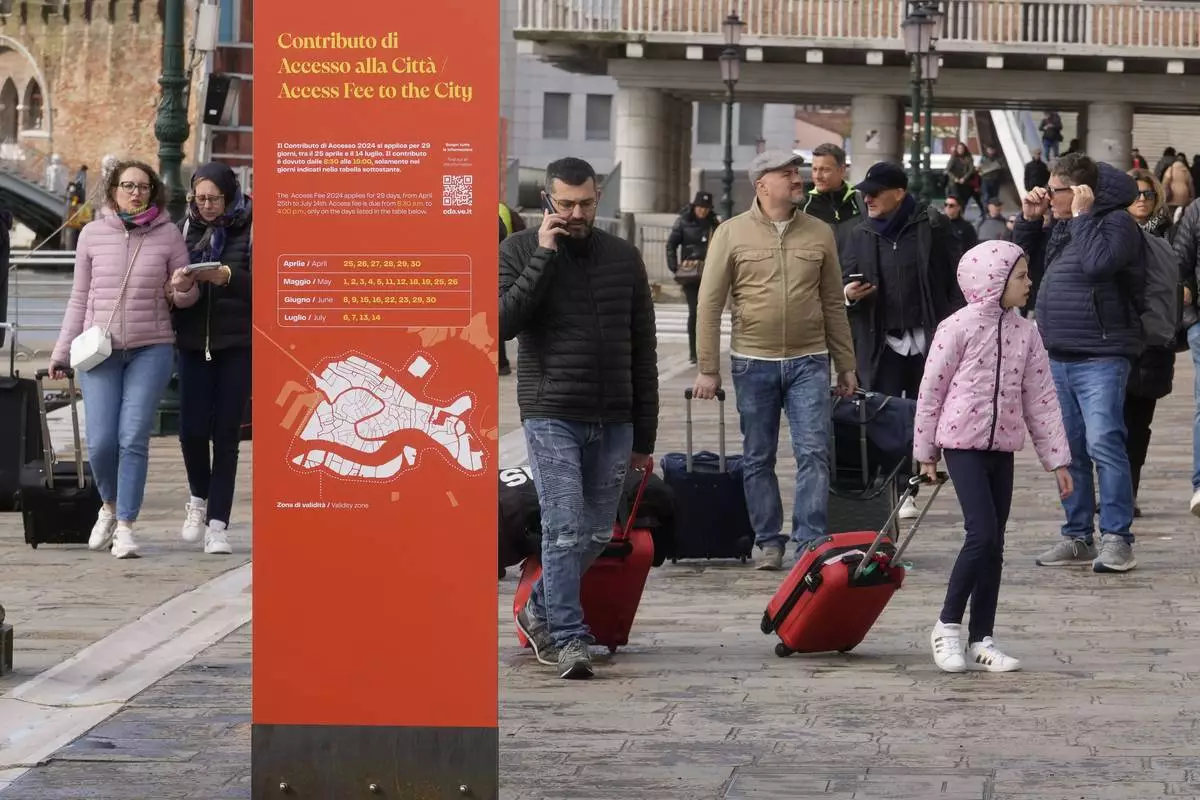
Tourists arrive in Venice, Italy, Thursday, April 25, 2024. The fragile lagoon city of Venice begins a pilot program Thursday to charge daytrippers a 5 euro entry fee that authorities hope will discourage tourists from arriving on peak days. The daytripper tax is being tested on 29 days through July, mostly weekends and holidays starting with Italy's Liberation Day holiday Thursday. Officials expect some 10,000 people will pay the fee to access the city on the first day, downloading a QR code to prove their payment, while another 70,000 will receive exceptions, for example, because they work in Venice or live in the Veneto region. (AP Photo/Luca Bruno)
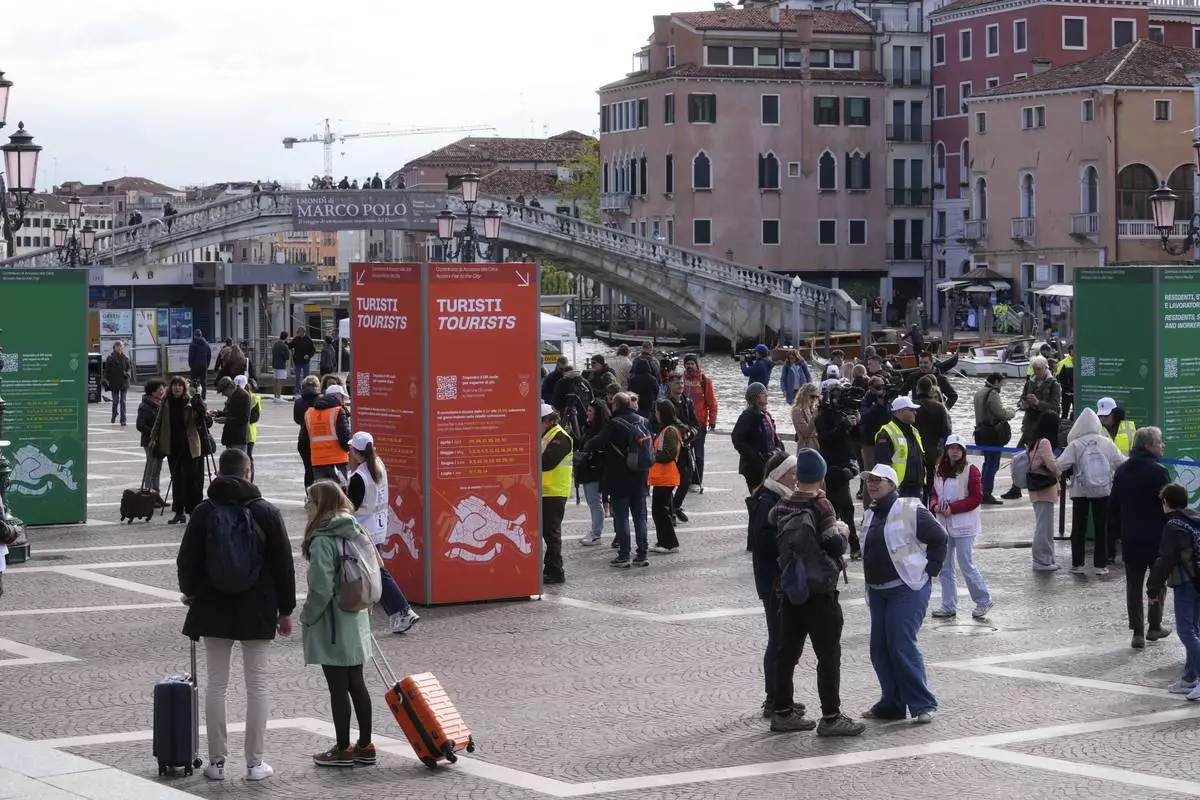
Stewards check tourists QR code access outside the main train station in Venice, Italy, Thursday, April 25, 2024. The fragile lagoon city of Venice begins a pilot program Thursday to charge daytrippers a 5 euro entry fee that authorities hope will discourage tourists from arriving on peak days. The daytripper tax is being tested on 29 days through July, mostly weekends and holidays starting with Italy's Liberation Day holiday Thursday. Officials expect some 10,000 people will pay the fee to access the city on the first day, downloading a QR code to prove their payment, while another 70,000 will receive exceptions, for example, because they work in Venice or live in the Veneto region. (AP Photo/Luca Bruno)

Stewards check a tourist QR code access outside the main train station in Venice, Italy, Thursday, April 25, 2024. The fragile lagoon city of Venice begins a pilot program Thursday to charge daytrippers a 5 euro entry fee that authorities hope will discourage tourists from arriving on peak days. The daytripper tax is being tested on 29 days through July, mostly weekends and holidays starting with Italy's Liberation Day holiday Thursday. Officials expect some 10,000 people will pay the fee to access the city on the first day, downloading a QR code to prove their payment, while another 70,000 will receive exceptions, for example, because they work in Venice or live in the Veneto region. (AP Photo/Luca Bruno)
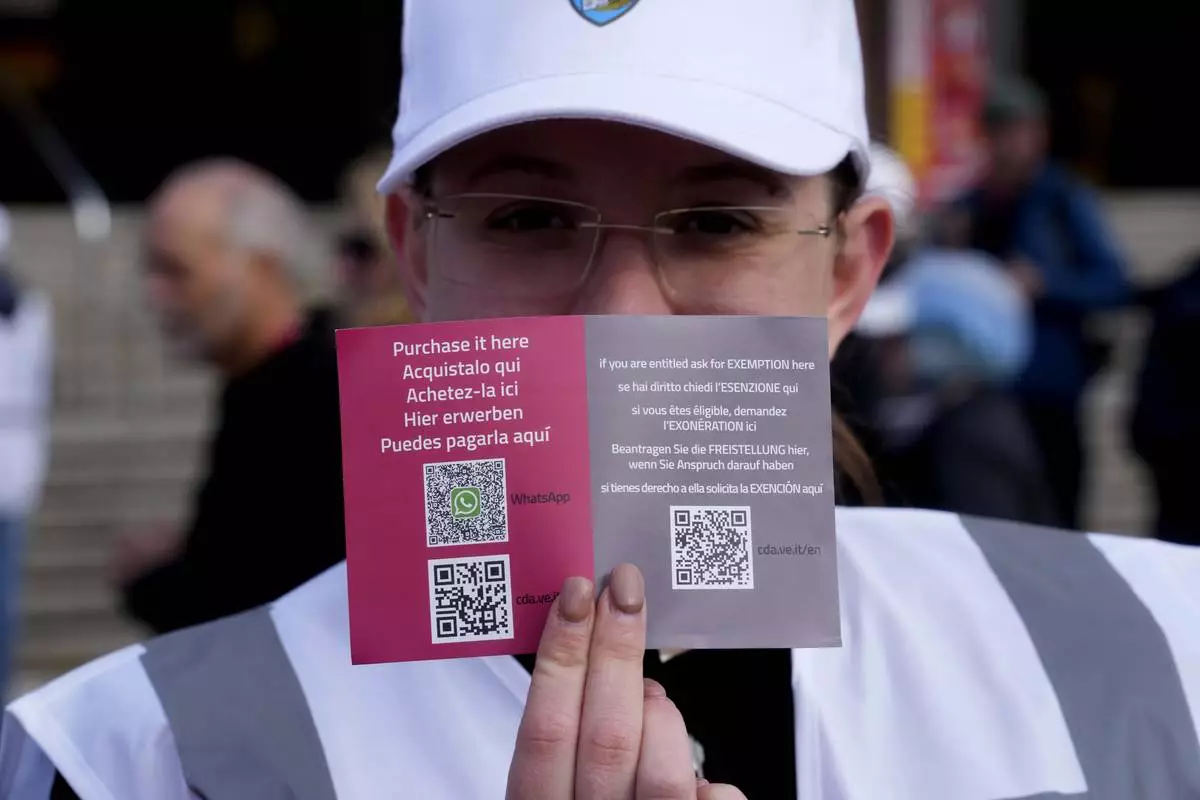
A steward shows the QR code access outside the main train station in Venice, Italy, Thursday, April 25, 2024. The fragile lagoon city of Venice begins a pilot program Thursday to charge daytrippers a 5 euro entry fee that authorities hope will discourage tourists from arriving on peak days. The daytripper tax is being tested on 29 days through July, mostly weekends and holidays starting with Italy's Liberation Day holiday Thursday. Officials expect some 10,000 people will pay the fee to access the city on the first day, downloading a QR code to prove their payment, while another 70,000 will receive exceptions, for example, because they work in Venice or live in the Veneto region. (AP Photo/Luca Bruno)
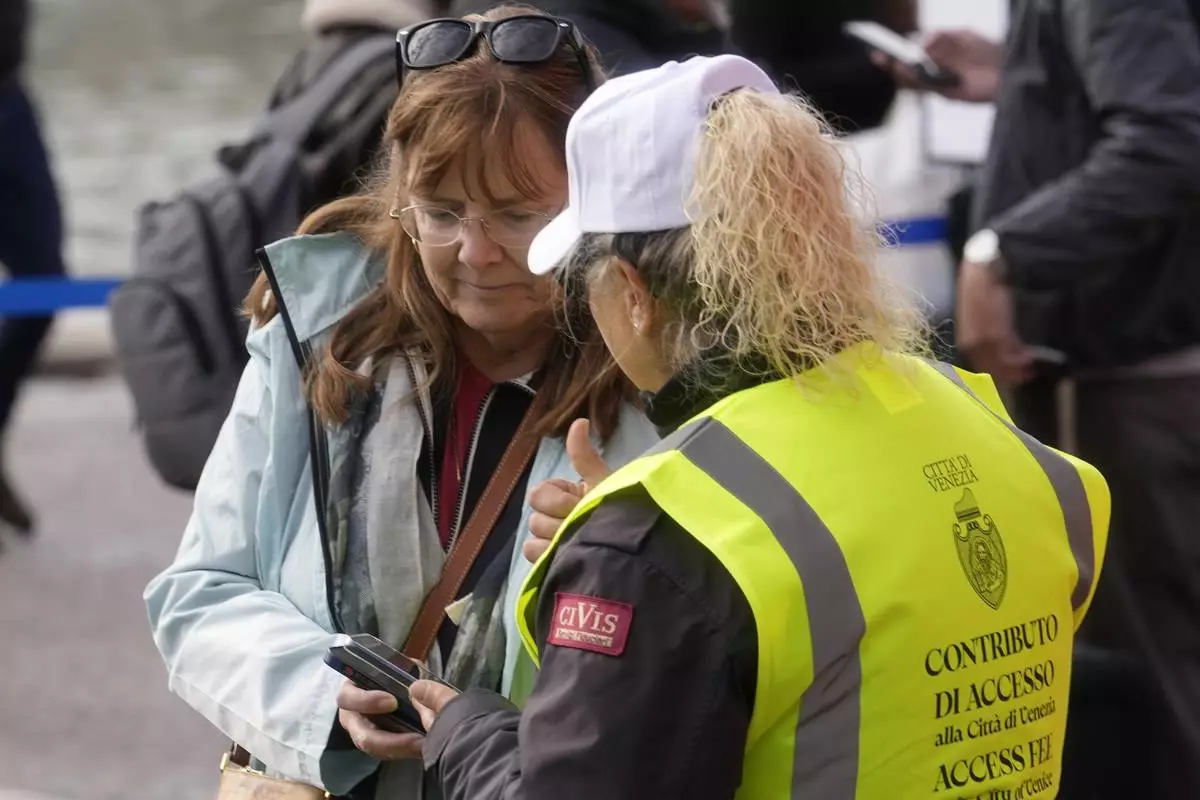
A steward checks a tourist QR code access outside the main train station in Venice, Italy, Thursday, April 25, 2024. The fragile lagoon city of Venice begins a pilot program Thursday to charge daytrippers a 5 euro entry fee that authorities hope will discourage tourists from arriving on peak days. The daytripper tax is being tested on 29 days through July, mostly weekends and holidays starting with Italy's Liberation Day holiday Thursday. Officials expect some 10,000 people will pay the fee to access the city on the first day, downloading a QR code to prove their payment, while another 70,000 will receive exceptions, for example, because they work in Venice or live in the Veneto region. (AP Photo/Luca Bruno)
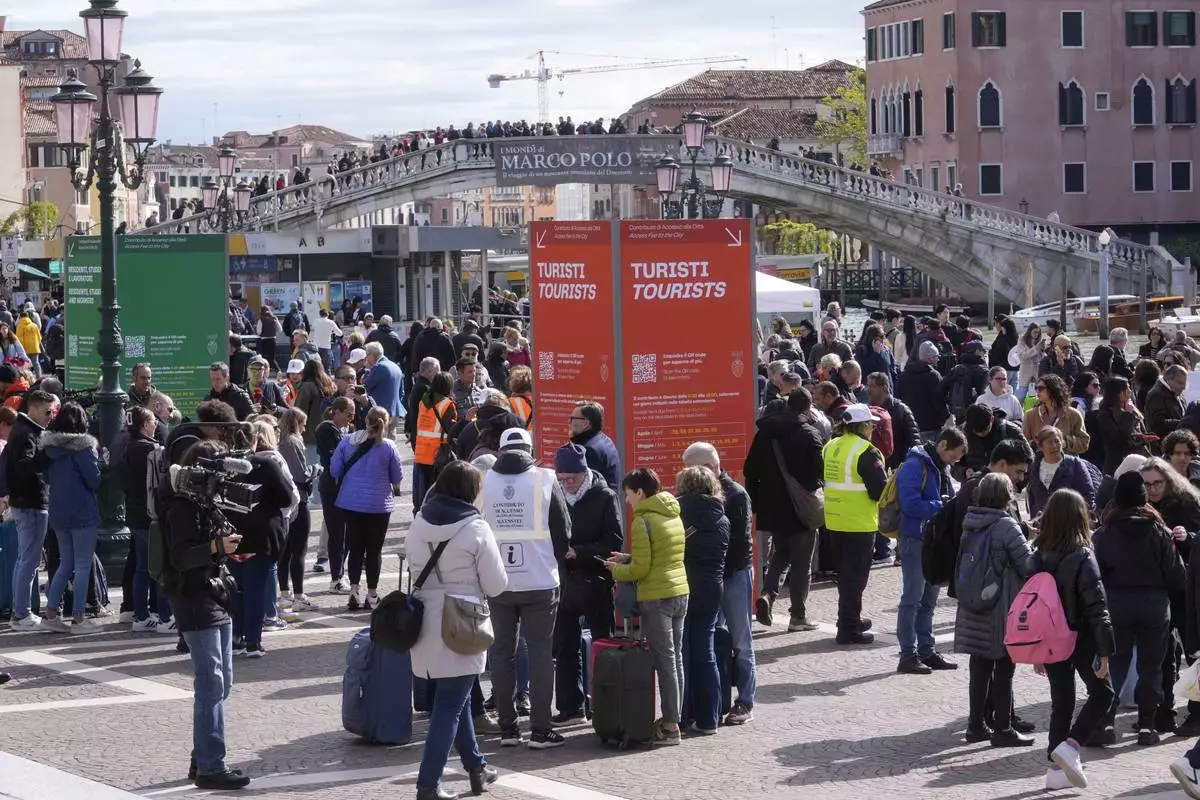
Stewards check tourists QR code access outside the main train station in Venice, Italy, Thursday, April 25, 2024. The fragile lagoon city of Venice begins a pilot program Thursday to charge daytrippers a 5 euro entry fee that authorities hope will discourage tourists from arriving on peak days. The daytripper tax is being tested on 29 days through July, mostly weekends and holidays starting with Italy's Liberation Day holiday Thursday. Officials expect some 10,000 people will pay the fee to access the city on the first day, downloading a QR code to prove their payment, while another 70,000 will receive exceptions, for example, because they work in Venice or live in the Veneto region. (AP Photo/Luca Bruno)
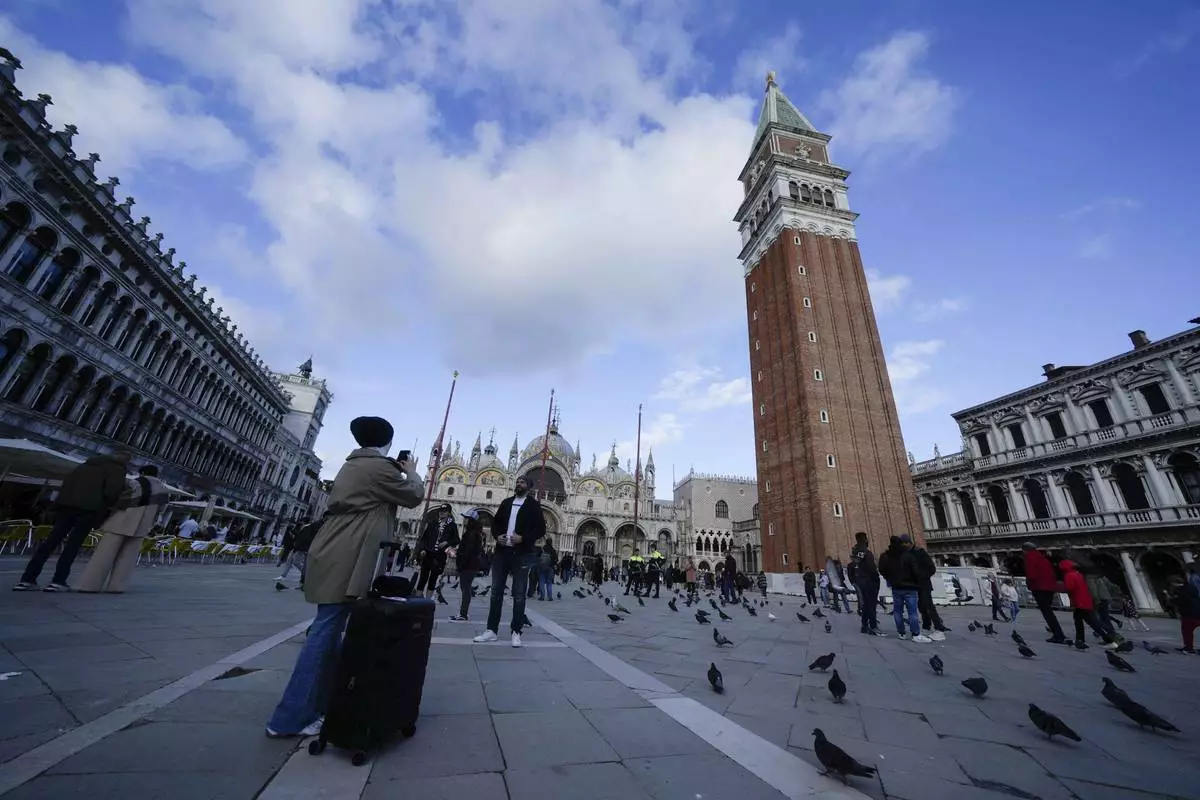
Tourists take pictures at the St. Mark square in Venice, Italy, Wednesday, April 24, 2024. The lagoon city of Venice begins a pilot program Thursday, April 25, 2024 to charge daytrippers a 5 euro entry fee that authorities hope will discourage tourists from arriving on peak days. Officials expect some 10,000 people will pay the fee to access the city on the first day, downloading a QR code to prove their payment. (AP Photo/Luca Bruno)
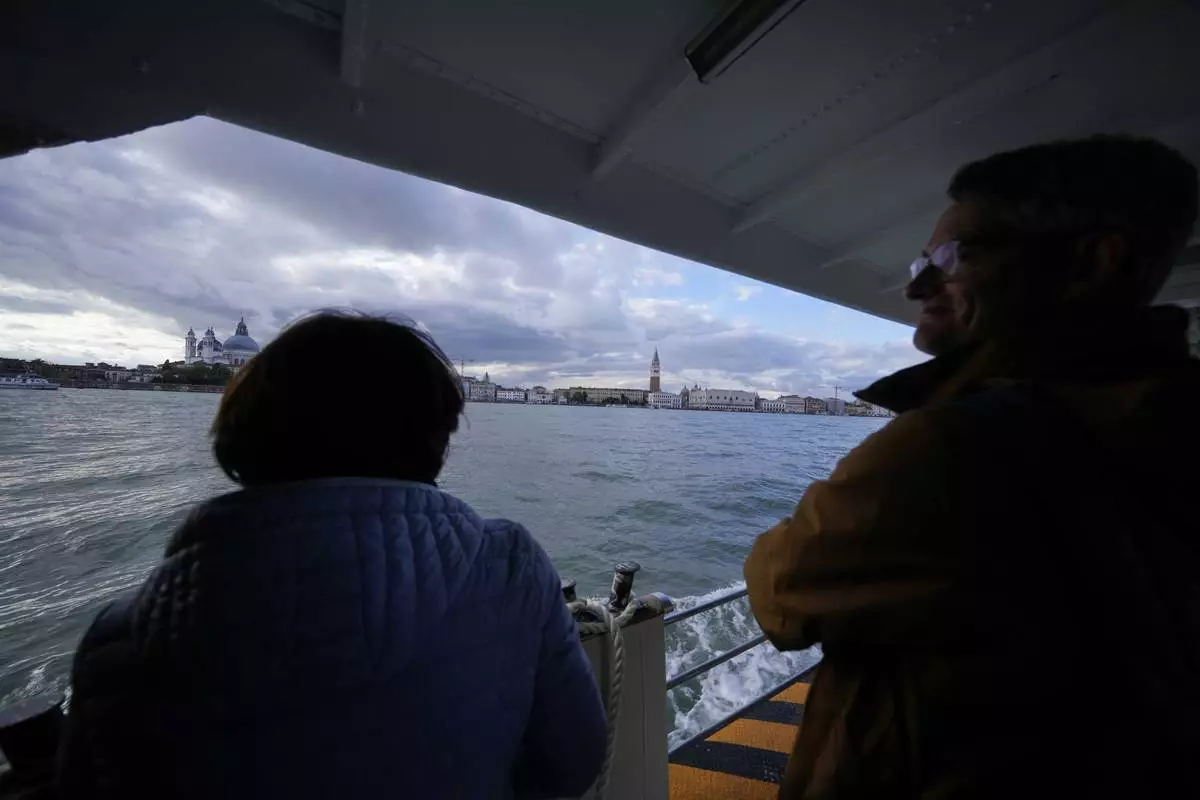
Tourists ride on a ferry boat in Venice, Italy, Wednesday, April 24, 2024. The lagoon city of Venice begins a pilot program Thursday, April 25, 2024 to charge daytrippers a 5 euro entry fee that authorities hope will discourage tourists from arriving on peak days. Officials expect some 10,000 people will pay the fee to access the city on the first day, downloading a QR code to prove their payment. (AP Photo/Luca Bruno)
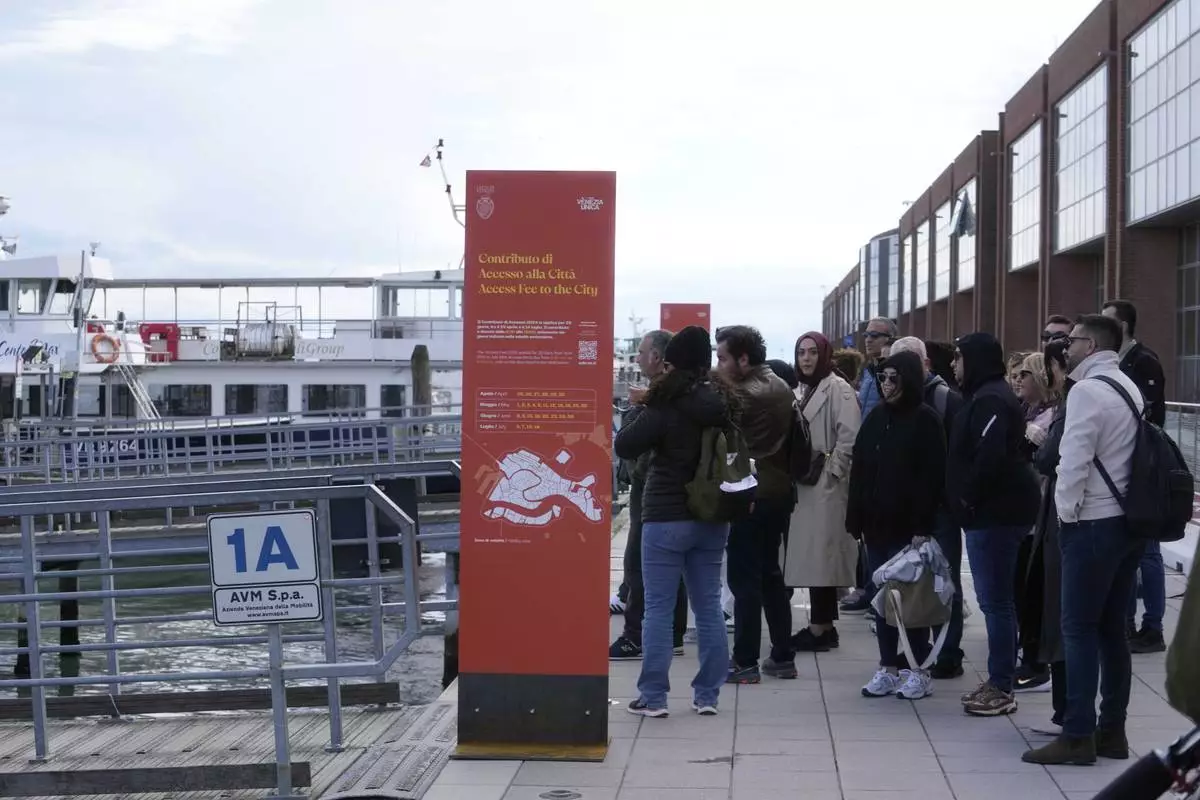
People stand in front of an information board explaining how to pay the tourist tax in Venice, Italy, Wednesday, April 24, 2024. The lagoon city of Venice begins a pilot program Thursday, April 25, 2024 to charge daytrippers a 5 euro entry fee that authorities hope will discourage tourists from arriving on peak days. Officials expect some 10,000 people will pay the fee to access the city on the first day, downloading a QR code to prove their payment. (AP Photo/Luca Bruno)

Marco Bettini, director of Venis Informatics System, gestures as he talks to reporters at the police Venice control room, in Venice, Italy, Wednesday, April 24, 2024. The lagoon city of Venice begins a pilot program Thursday, April 25, 2024 to charge daytrippers a 5 euro entry fee that authorities hope will discourage tourists from arriving on peak days. Officials expect some 10,000 people will pay the fee to access the city on the first day, downloading a QR code to prove their payment. (AP Photo/Luca Bruno)
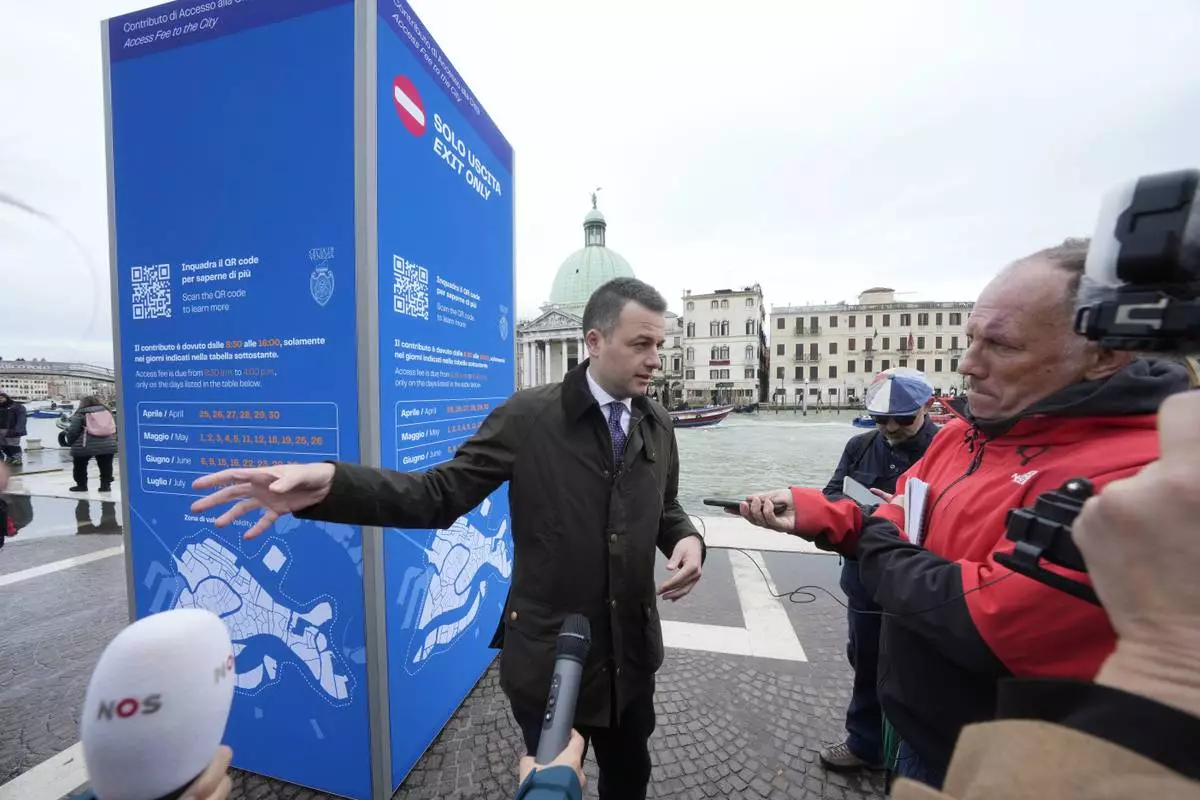
Venice councillor Simone Venturini speaks with reporters in front of a tourist tax totem in Venice, Italy, Wednesday, April 24, 2024. The lagoon city of Venice begins a pilot program Thursday, April 25, 2024 to charge daytrippers a 5 euro entry fee that authorities hope will discourage tourists from arriving on peak days. Officials expect some 10,000 people will pay the fee to access the city on the first day, downloading a QR code to prove their payment. (AP Photo/Luca Bruno)
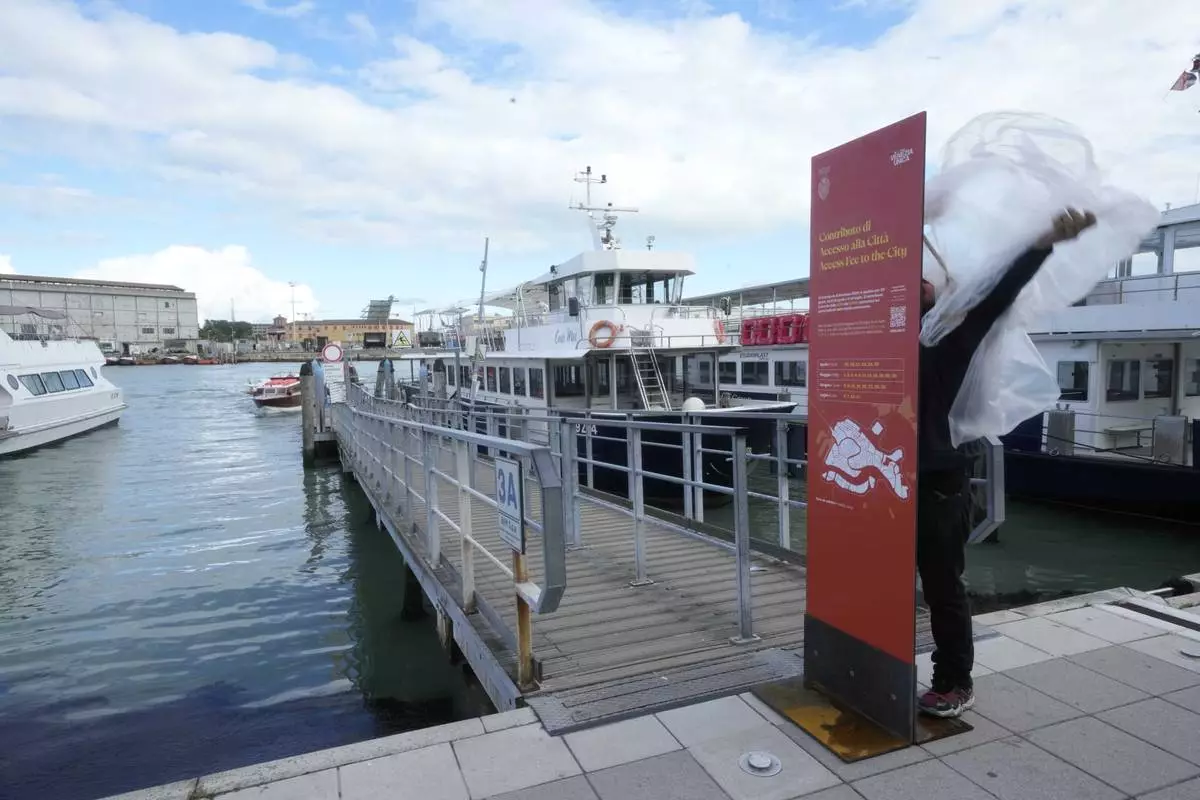
Workers prepare banner explaining how to pay the tourist tax in Venice, Italy, Wednesday, April 24, 2024. The lagoon city of Venice begins a pilot program Thursday, April 25, 2024 to charge daytrippers a 5 euro entry fee that authorities hope will discourage tourists from arriving on peak days. Officials expect some 10,000 people will pay the fee to access the city on the first day, downloading a QR code to prove their payment. (AP Photo/Luca Bruno)
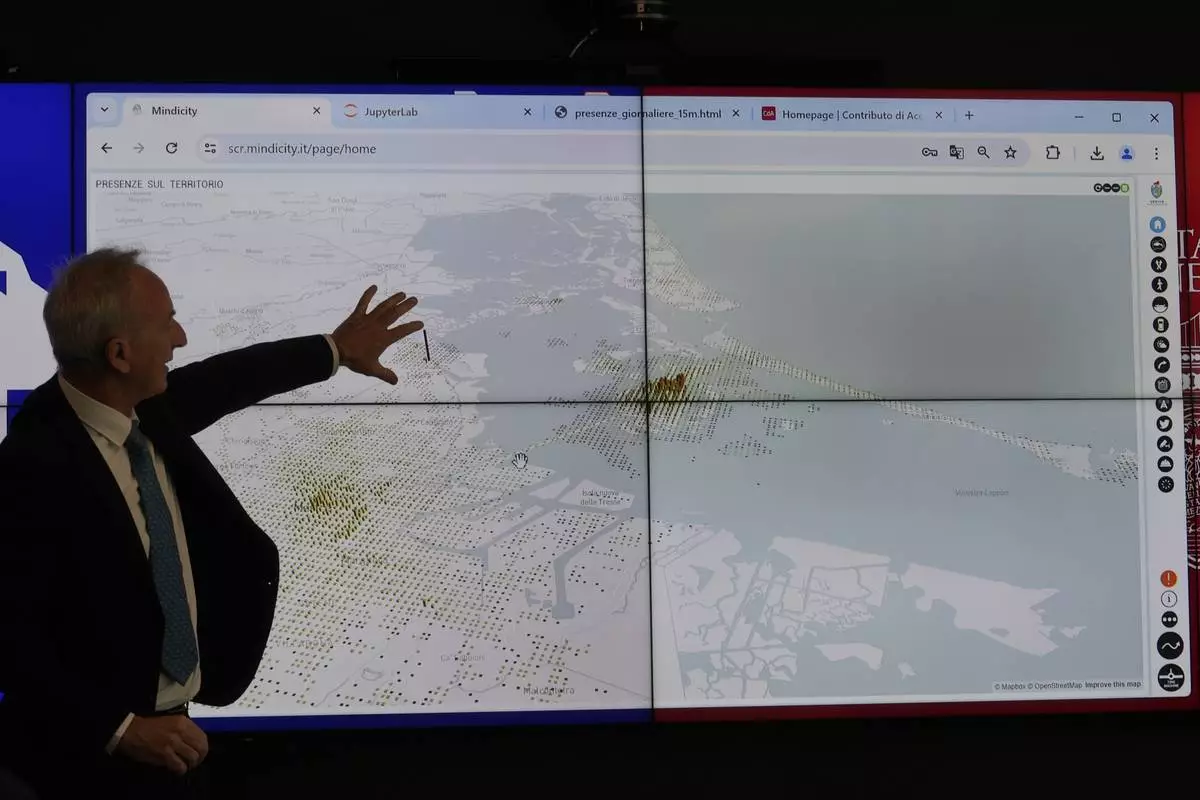
Marco Bettini, director of Venis Informatics System, gestures as he explains the Venice density to reporters at the police Venice control room in Venice, Italy, Wednesday, April 24, 2024. The lagoon city of Venice begins a pilot program Thursday, April 25, 2024 to charge daytrippers a 5 euro entry fee that authorities hope will discourage tourists from arriving on peak days. Officials expect some 10,000 people will pay the fee to access the city on the first day, downloading a QR code to prove their payment. (AP Photo/Luca Bruno)
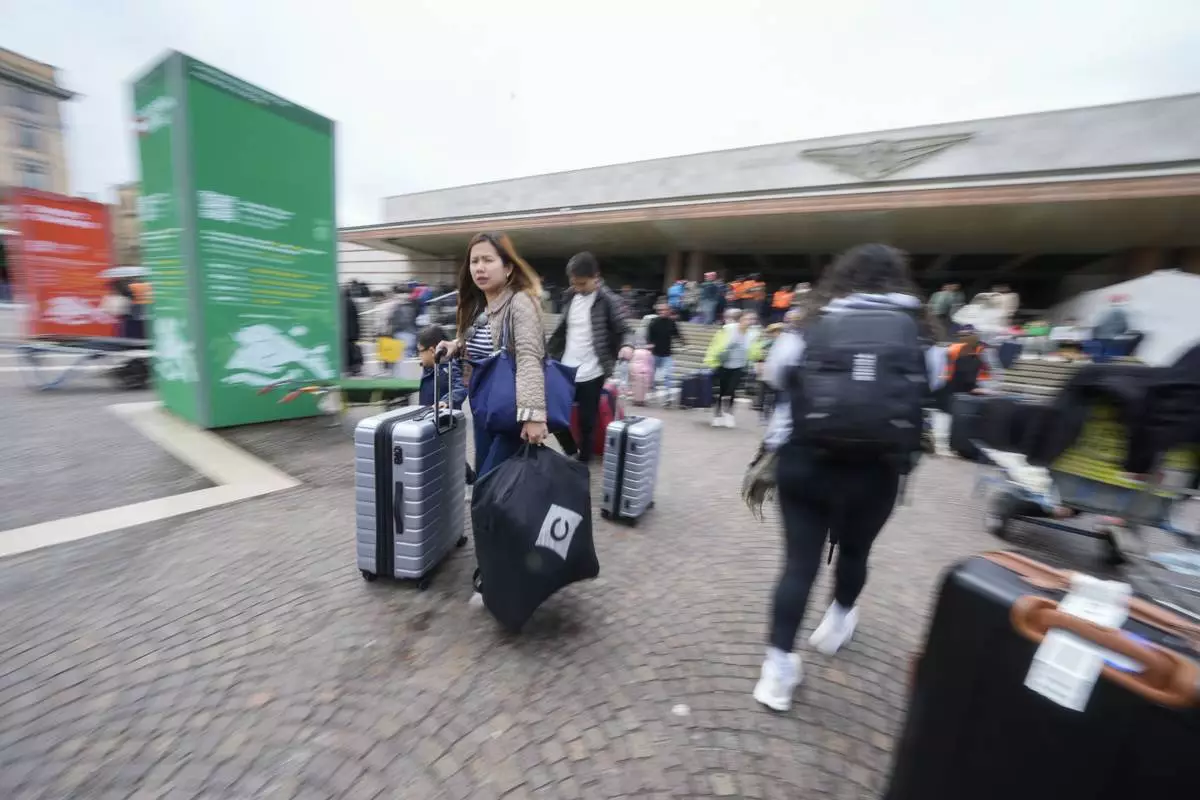
Tourists arrive at the main train station in Venice, Italy, Wednesday, April 24, 2024. The lagoon city of Venice begins a pilot program Thursday, April 25, 2024 to charge daytrippers a 5 euro entry fee that authorities hope will discourage tourists from arriving on peak days. Officials expect some 10,000 people will pay the fee to access the city on the first day, downloading a QR code to prove their payment. (AP Photo/Luca Bruno)
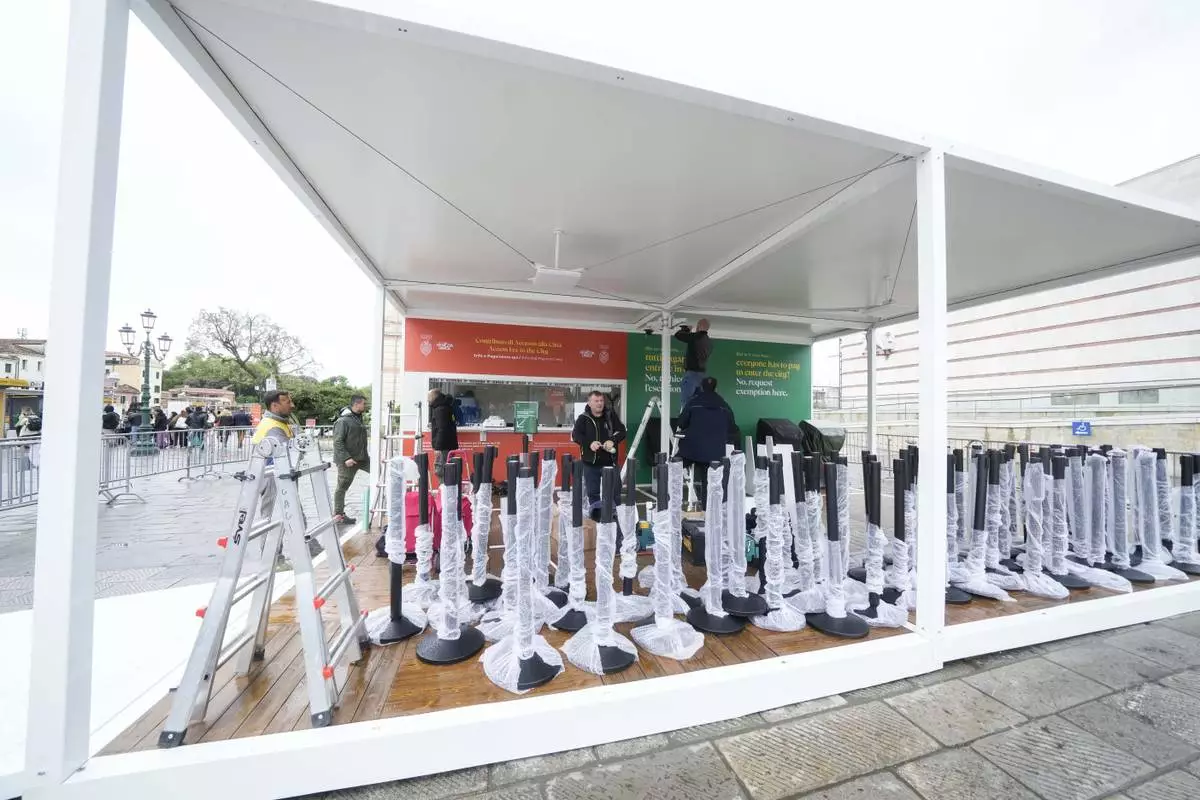
Workers prepare the tourist tax cashier desks outside the main train station in Venice, Italy, Wednesday, April 24, 2024. The lagoon city of Venice begins a pilot program Thursday, April 25, 2024 to charge daytrippers a 5 euro entry fee that authorities hope will discourage tourists from arriving on peak days. Officials expect some 10,000 people will pay the fee to access the city on the first day, downloading a QR code to prove their payment. (AP Photo/Luca Bruno)
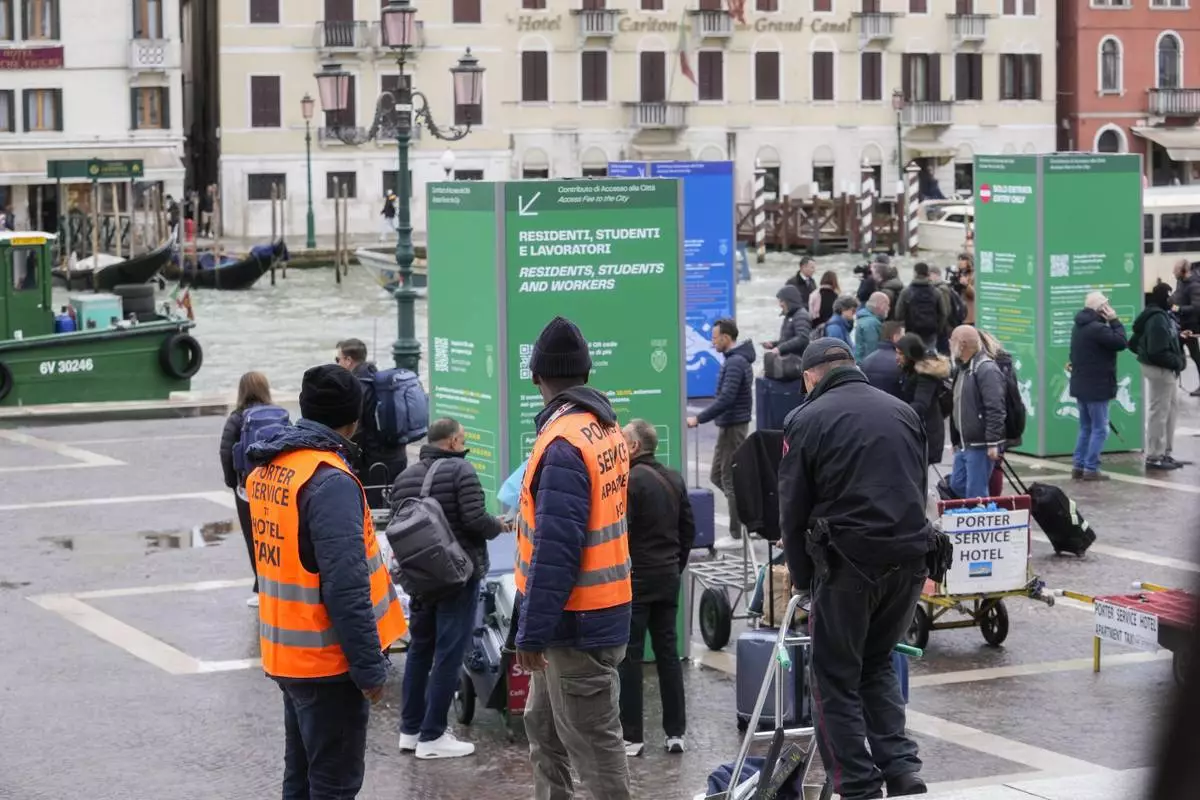
Porters wait for tourists outside the main train station in Venice, Italy, Wednesday, April 24, 2024. The lagoon city of Venice begins a pilot program Thursday, April 25, 2024 to charge daytrippers a 5 euro entry fee that authorities hope will discourage tourists from arriving on peak days. Officials expect some 10,000 people will pay the fee to access the city on the first day, downloading a QR code to prove their payment. (AP Photo/Luca Bruno)
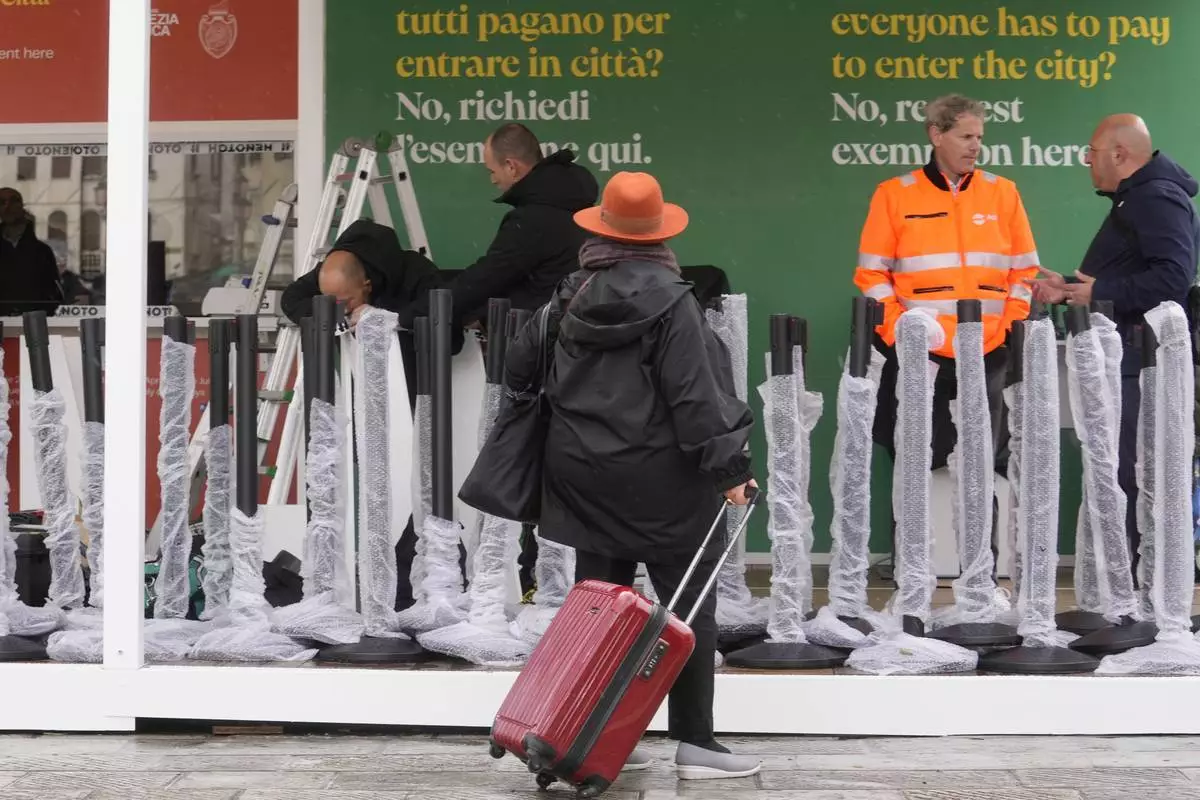
Workers prepare the tourist tax cashier desks outside the main train station in Venice, Italy, Wednesday, April 24, 2024. The lagoon city of Venice begins a pilot program Thursday, April 25, 2024 to charge daytrippers a 5 euro entry fee that authorities hope will discourage tourists from arriving on peak days. Officials expect some 10,000 people will pay the fee to access the city on the first day, downloading a QR code to prove their payment. (AP Photo/Luca Bruno)
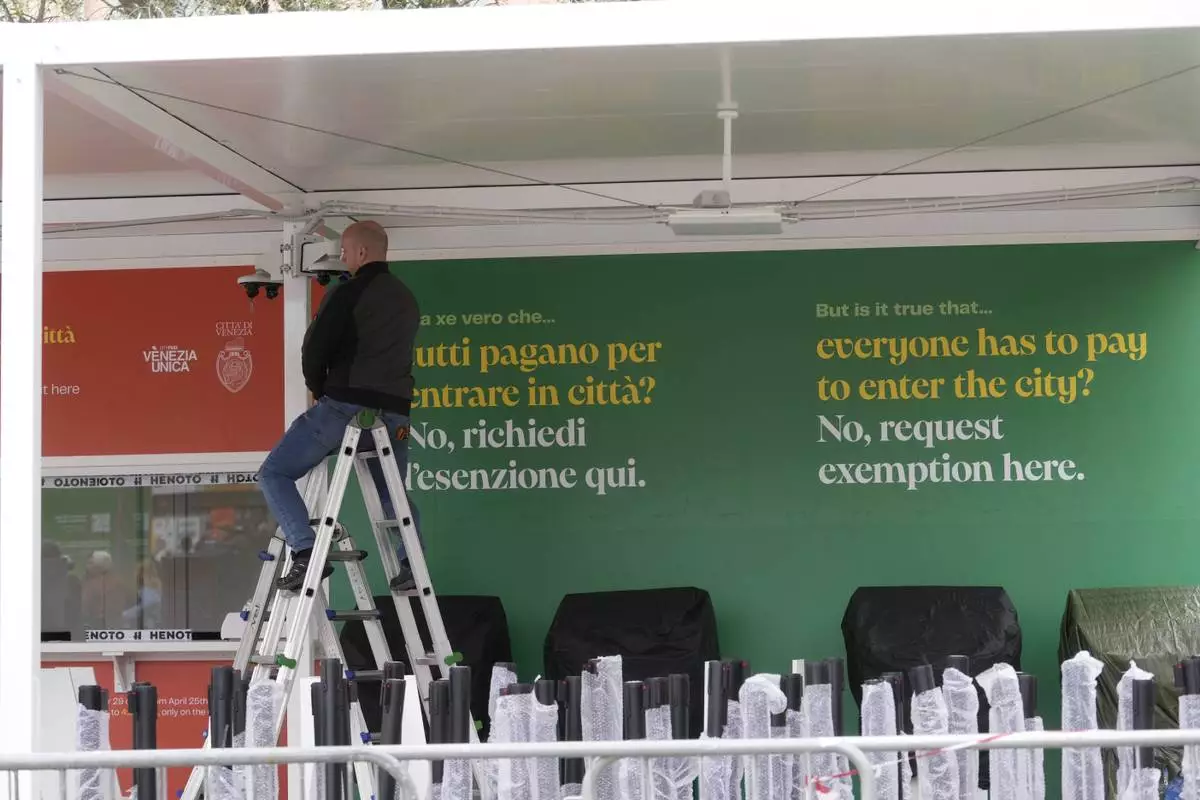
Workers prepare the tourist tax cashier desks outside the main train station in Venice, Italy, Wednesday, April 24, 2024. The lagoon city of Venice begins a pilot program Thursday, April 25, 2024 to charge daytrippers a 5 euro entry fee that authorities hope will discourage tourists from arriving on peak days. Officials expect some 10,000 people will pay the fee to access the city on the first day, downloading a QR code to prove their payment. (AP Photo/Luca Bruno)
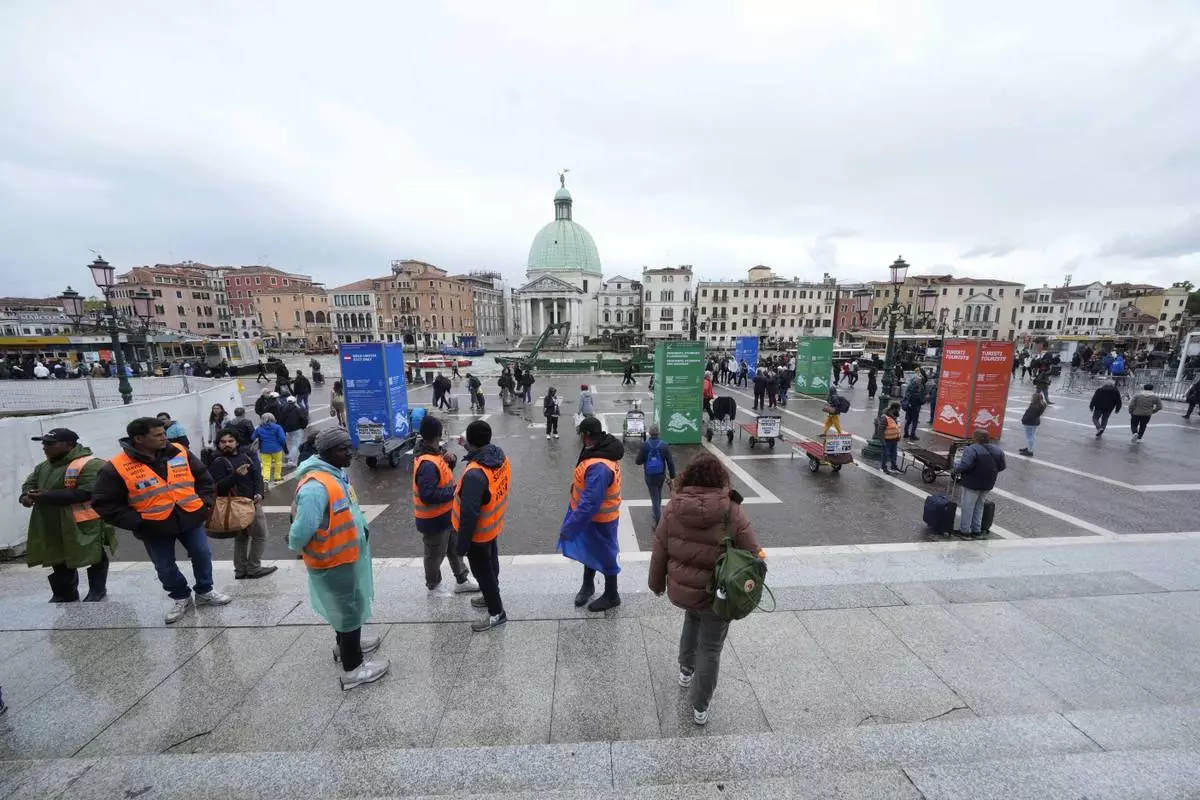
Porters wait for tourists outside the main train station in Venice, Italy, Wednesday, April 24, 2024. The lagoon city of Venice begins a pilot program Thursday, April 25, 2024 to charge daytrippers a 5 euro entry fee that authorities hope will discourage tourists from arriving on peak days. Officials expect some 10,000 people will pay the fee to access the city on the first day, downloading a QR code to prove their payment. (AP Photo/Luca Bruno)
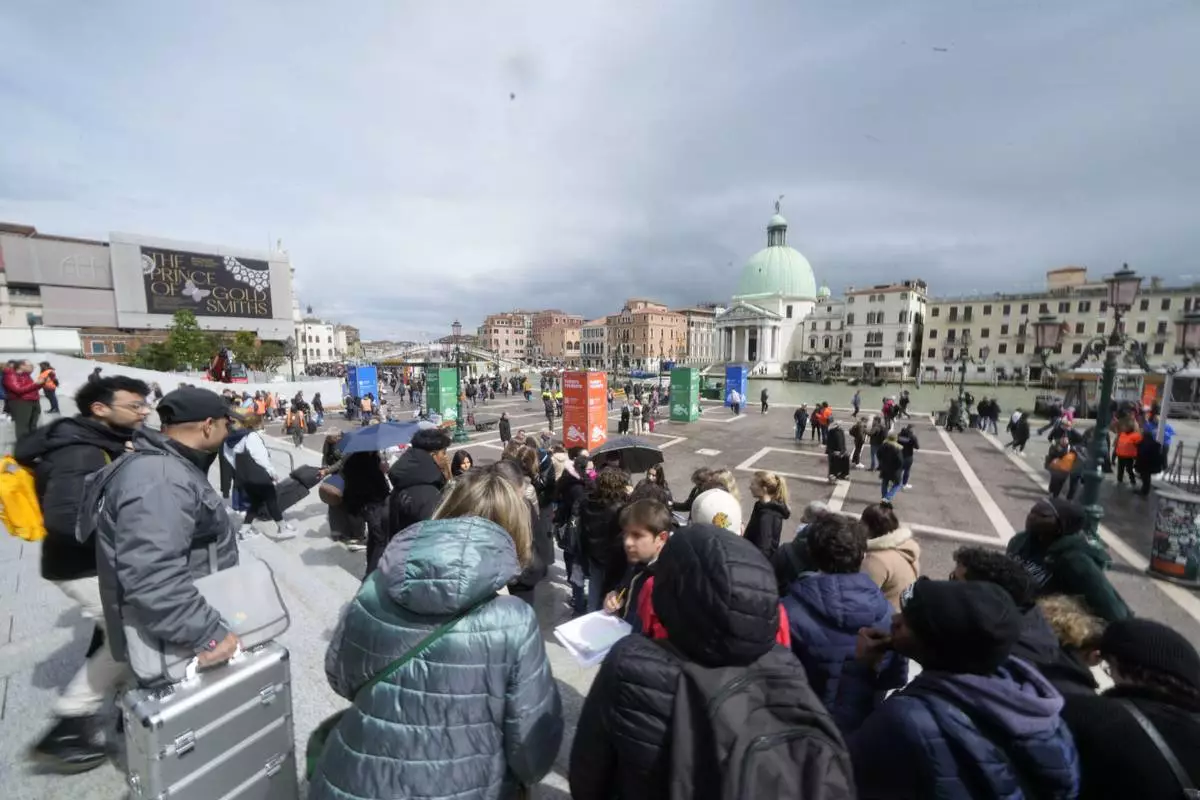
Tourists arrive outside the main train station in Venice, Italy, Wednesday, April 24, 2024. The lagoon city of Venice begins a pilot program Thursday, April 25, 2024 to charge daytrippers a 5 euro entry fee that authorities hope will discourage tourists from arriving on peak days. Officials expect some 10,000 people will pay the fee to access the city on the first day, downloading a QR code to prove their payment. (AP Photo/Luca Bruno)
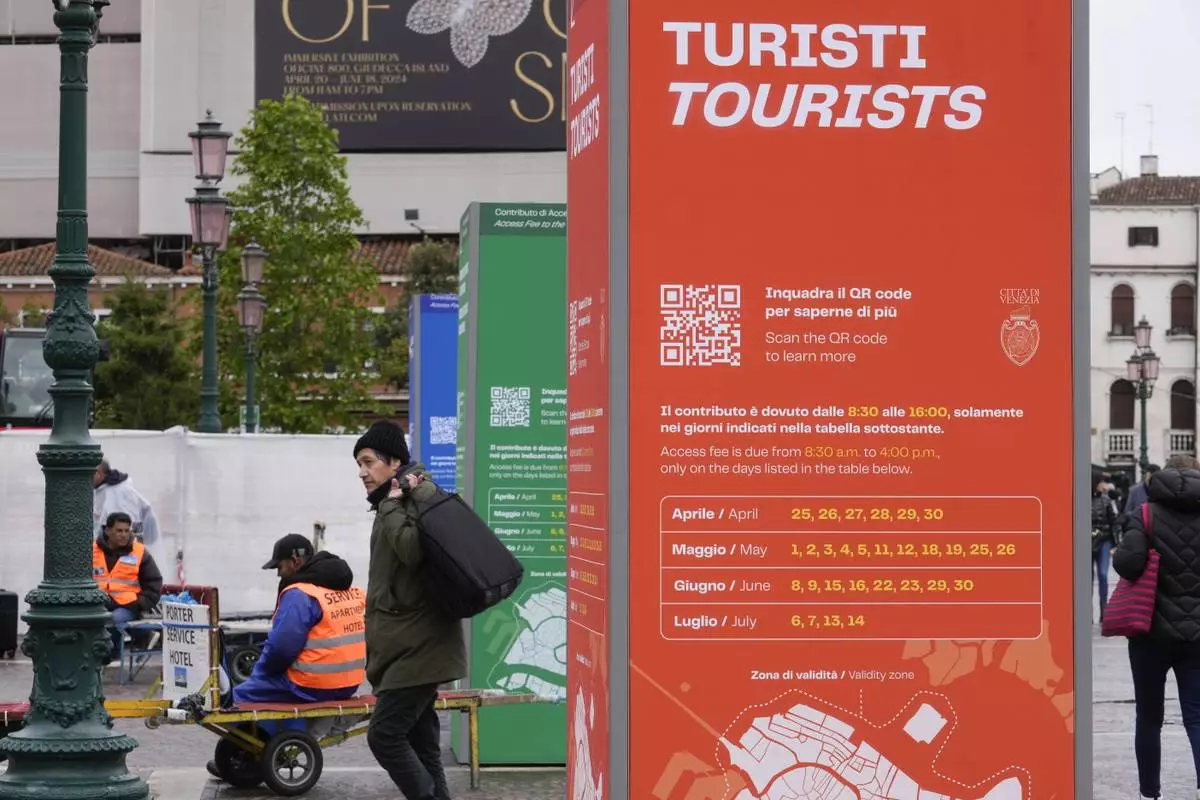
Tourist information boards are seen outside the main train station in Venice, Italy, Wednesday, April 24, 2024. The lagoon city of Venice begins a pilot program Thursday, April 25, 2024 to charge daytrippers a 5 euro entry fee that authorities hope will discourage tourists from arriving on peak days. Officials expect some 10,000 people will pay the fee to access the city on the first day, downloading a QR code to prove their payment. (AP Photo/Luca Bruno)
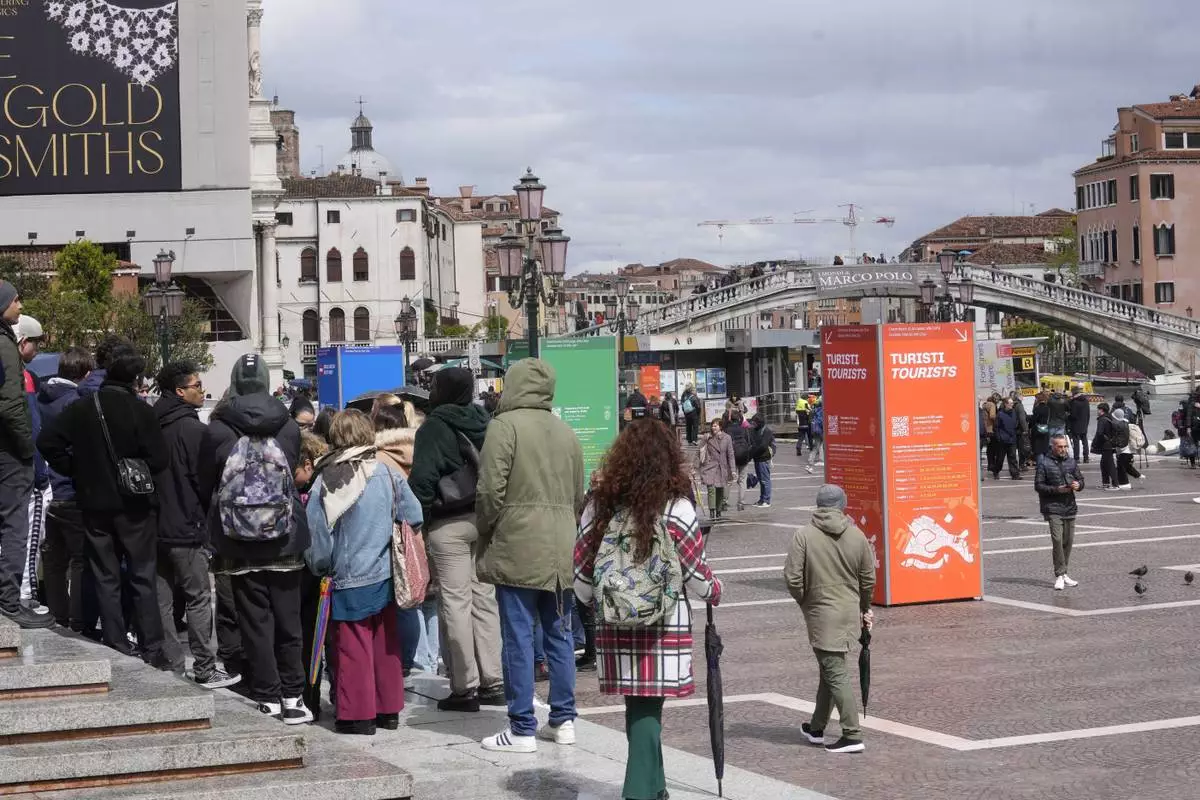
Tourists arrive outside the main train station in Venice, Italy, Wednesday, April 24, 2024. The lagoon city of Venice begins a pilot program Thursday, April 25, 2024 to charge daytrippers a 5 euro entry fee that authorities hope will discourage tourists from arriving on peak days. Officials expect some 10,000 people will pay the fee to access the city on the first day, downloading a QR code to prove their payment. (AP Photo/Luca Bruno)





































